On the 15th of November 2022, CECOP organized the conference “Cooperatives Care! How to empower cooperatives as frontrunners of innovation in the care sector?”.
The event was an opportunity to take stock of the EU Care Strategy, analyze how cooperatives can contribute to its implementation, and share the key policy messages that drove CECOP’s “Cooperatives Care!” campaign that started six months prior. The conference was centered on the crucial role played by cooperatives in the care sector as frontrunners of both social and technological innovation. Around 80 participants attended the event, with 30 people present physically in Brussels and 50 online.
Starting in April, CECOP’s “Cooperatives Care!” campaign had the mission to highlight cooperatives’ contribution to the care sector and to provide policy recommendations for the upcoming EU Care Strategy. Indeed, care cooperatives are growing significantly, spanning multiple European countries, employing hundreds of thousands of workers, and serving millions of people today. Covering all types of care services, including home care, nurseries, residential and day centers for children and adults, elderly care, and more, cooperatives are driven by the needs of the communities and care workers. This reality was showcased throughout the campaign by different means, including a policy report and a series of four videos and a social media campaign. The conference "Cooperatives Care! How to empower cooperatives as frontrunners of innovation in the care sector?" contributed to this effort by answering the question “what makes cooperatives unique compared to other care providers?”; opening a platform for in-person exchange between cooperatives from CECOP’s network and other EU stakeholders, including the EU institutions; and promoting a discussion on the implementation of the European Care Strategy package, adopted by the Commission in September 2022.
The program of the event was divided into two sections: an introduction with keynote speeches to set the scene, and then three panels enabling exchange among different stakeholders.
Introduction
During the introduction part, following the welcoming speech of CECOP’s Secretary General Diana Dovgan and the moderator of the event Valerio Pellirossi, the last video of CECOP’s campaign “Cooperatives Care!” was premiered. The video highlights the role of cooperatives as care providers and their unique advantages.
After that, a video address of European Commission Nicolas Schmit followed. During his address, the Commissioner especially highlighted the value cooperatives provide to the European care sector and appreciated the fact that they involve all concerned parties, from beneficiaries to NGOs, in promoting community-based care models and providing quality services in remote and rural areas.
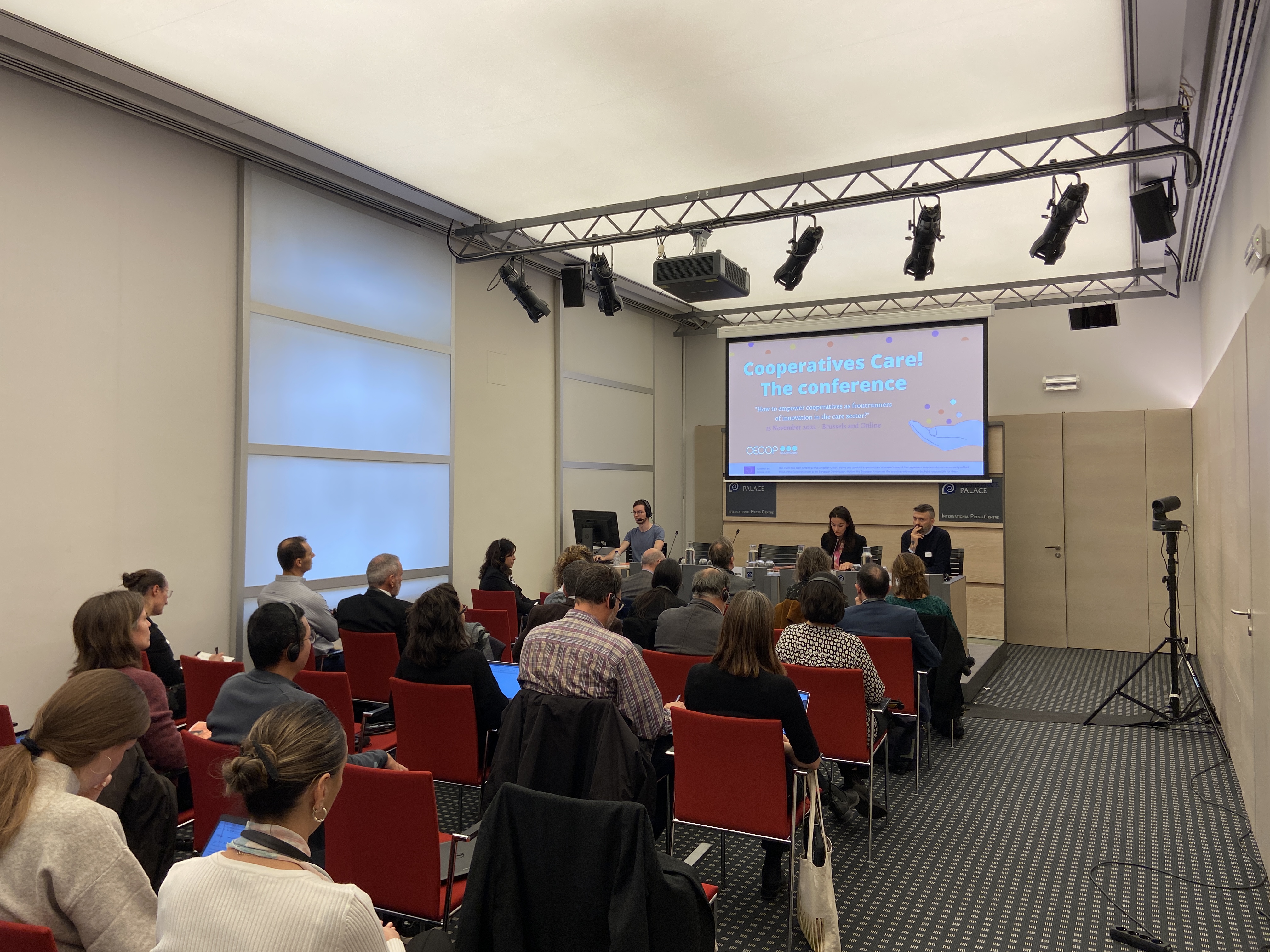
Picture: Conference
Next on the program was the address of Sirpa Pietikäinen, Member of the European Parliament (MEP), who has been one of the co-rapporteurs for the European Parliament’s report “Towards a common European action on care” adopted on 5 July 2022. In her speech, the MEP described the three main advantages of cooperatives in the care sector:
- They are very stable elements of the economy, and this resilience is good for the care recipients.
- They provide a quality service without seeking to maximize their profit – important for both the care workers and the care recipients.
- They provide a better service by having the people that are impacted by the provision of care involved in the management of the service provider.
Ms Pietikäinen also pointed out that, in her opinion, at least one third of services across Europe should be provided by cooperatives that are owned in one way or another by those who are using the services. In continuation, Maria Jepsen, Deputy Director of Eurofound, presented an overview of the working conditions of care workers and citizens’ perceptions of quality long-term care in Europe based on Eurofound surveys. Some key take aways are that, while the sector has in general poor working conditions and low salaries, care workers perceive their work as being highly useful and meaningful and there is a correlation between working conditions and perceived quality of the service received by the users.
.
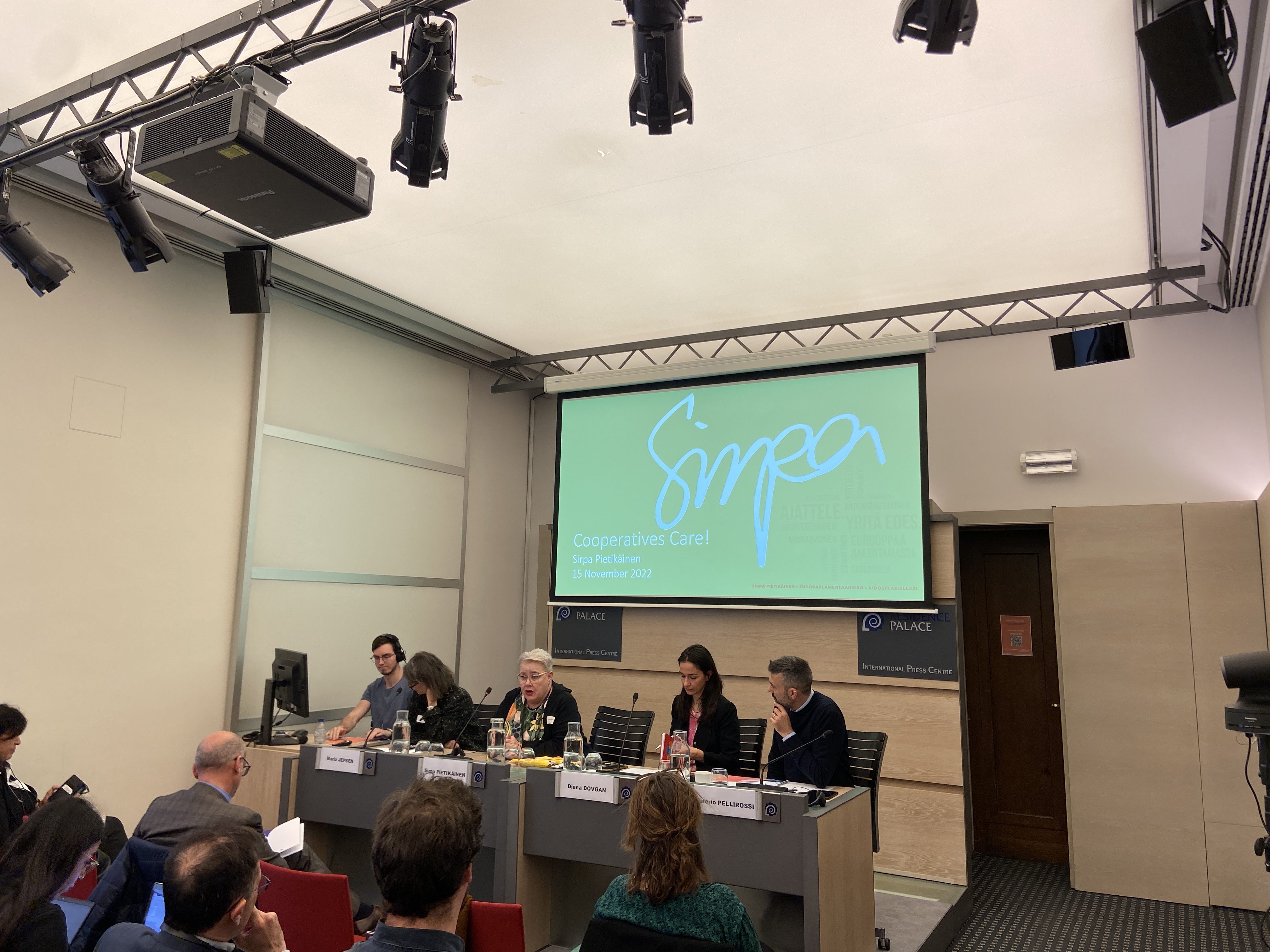
Picture: Sirpa Pietikäinen, Member of the European Parliament, presents her intervention
Panels
First panel
The first panel, titled “Technological innovation in care cooperatives: mission impossible? Testimonies from cooperatives across Europe”, was composed of representatives of two cooperatives from the CECOP’s network that are at the forefront of technological innovation in the care sector:
- Andere Goirigolzarri, researcher at Grupo SSI. This Spanish worker cooperative from the Basque Country, established in 1986, specializes in improving the quality of life of people who are no longer autonomous and/or and in a situation of social fragility.
- Dafne Guida, President of STRIPES. The name of the cooperative is an acronym in Italian for study, research, intervention, and extra-school pedagogy. This social cooperative, established in 1989 in Milan, is specialized in combining early childhood services with a focus on innovative teaching approaches.
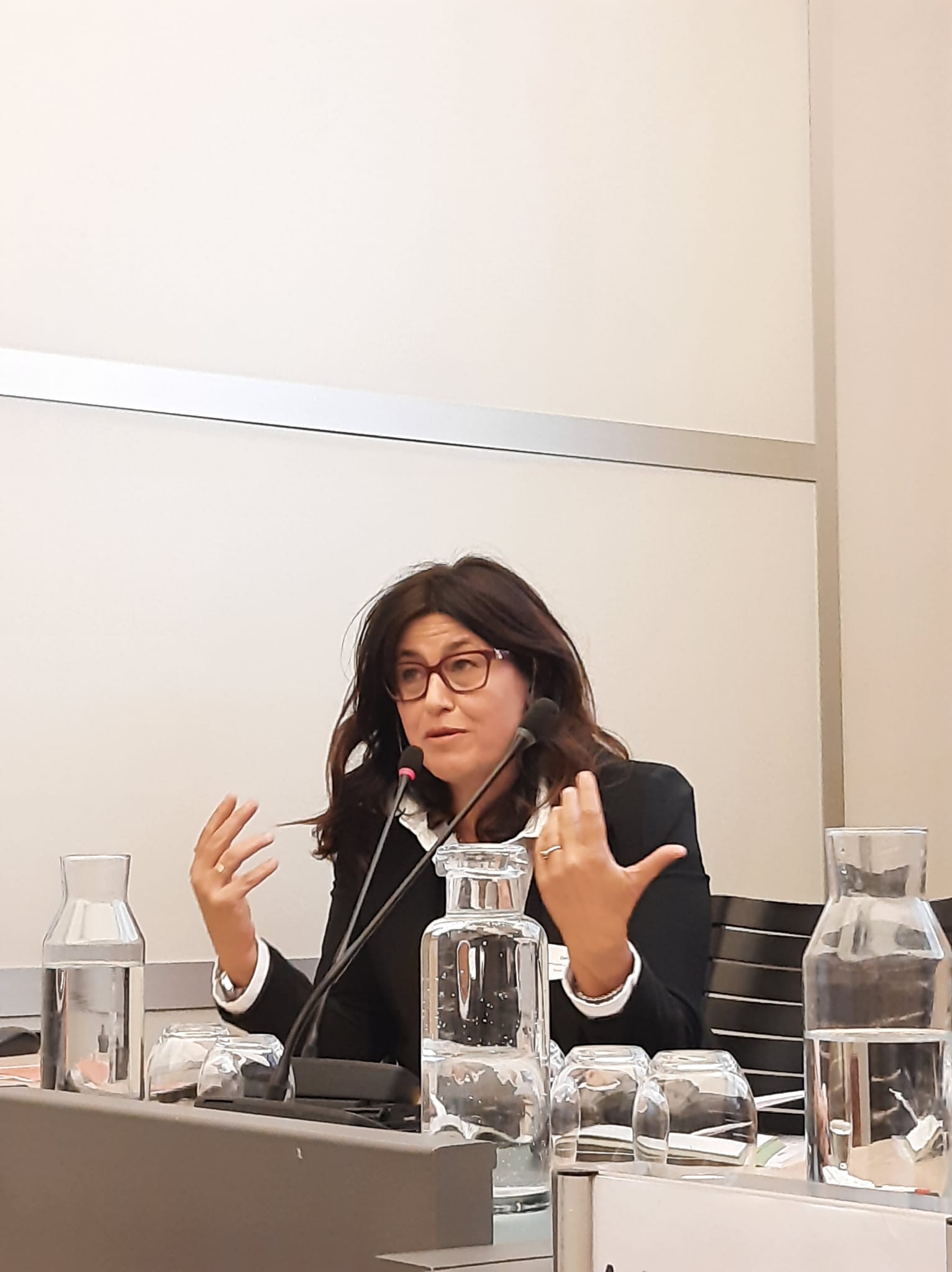
Picture: Dafne Guida, from Cooperative STRIPES, presents her intervention
The two speakers highlighted the key role their cooperatives play in their communities regarding closing the gap between care and the digital world. Grupo SSI, for instance, described how they develop applications that allow carers to monitor care recipients in their homes – giving them more autonomy and better follow-up to their needs in-between medical appointments. They also use such technologies as virtual reality for cognitive stimulation of elderly persons. STRIPES explained how they teach children about the digital space – first in an unplugged space from 0-6, to allow them to better grasp the concepts that rule that space. This cooperative also has its own robotics centre and devotes most of its time to research and innovation.
Second panel
The second panel, “Social innovation in care cooperatives: innovative solutions for unmet needs. Testimonies from cooperatives across Europe”, was an opportunity for three representatives from cooperatives to focus on the social innovation they provide to the sector of care. The cooperatives present were:
- Chrissy Meleady from the Cooperative Guild of Social and Community Workers, the UK. The guild, active since 2018, aims to help older people with care needs to take matters in their own hands in order to ensure democratic governance of service provision and social justice in care.
- Sébastien Tchernia, General Manager of Les 3 Colonnes, a social cooperative established in the French region of Auvergne-Rhône-Alpes in 2013. Les 3 Colonnes aims at helping the elderly to finance their home care. Their innovative modus operandi is as follows: the beneficiary (elderly person) joins the cooperative by selling them their property. In return, the cooperative provides the beneficiary with a monthly pension, thus financing their home care and other needs. When a beneficiary eventually passes away, the cooperative takes over the property and sells or rents it, reinvesting the margins for the benefit of new beneficiaries.
- Piotr Frołowicz, Chairman of the board of the social cooperative Alivio Group. The Polish social cooperative Alivio Group, registered in 2020 in Zielona Góra, provides a wide spectrum of services for the disabled and elderly people. At present, they run two respite centers that provide short-term care for up to 14 days. Their Centers provide also a tourist accommodation for people with physical disabilities.
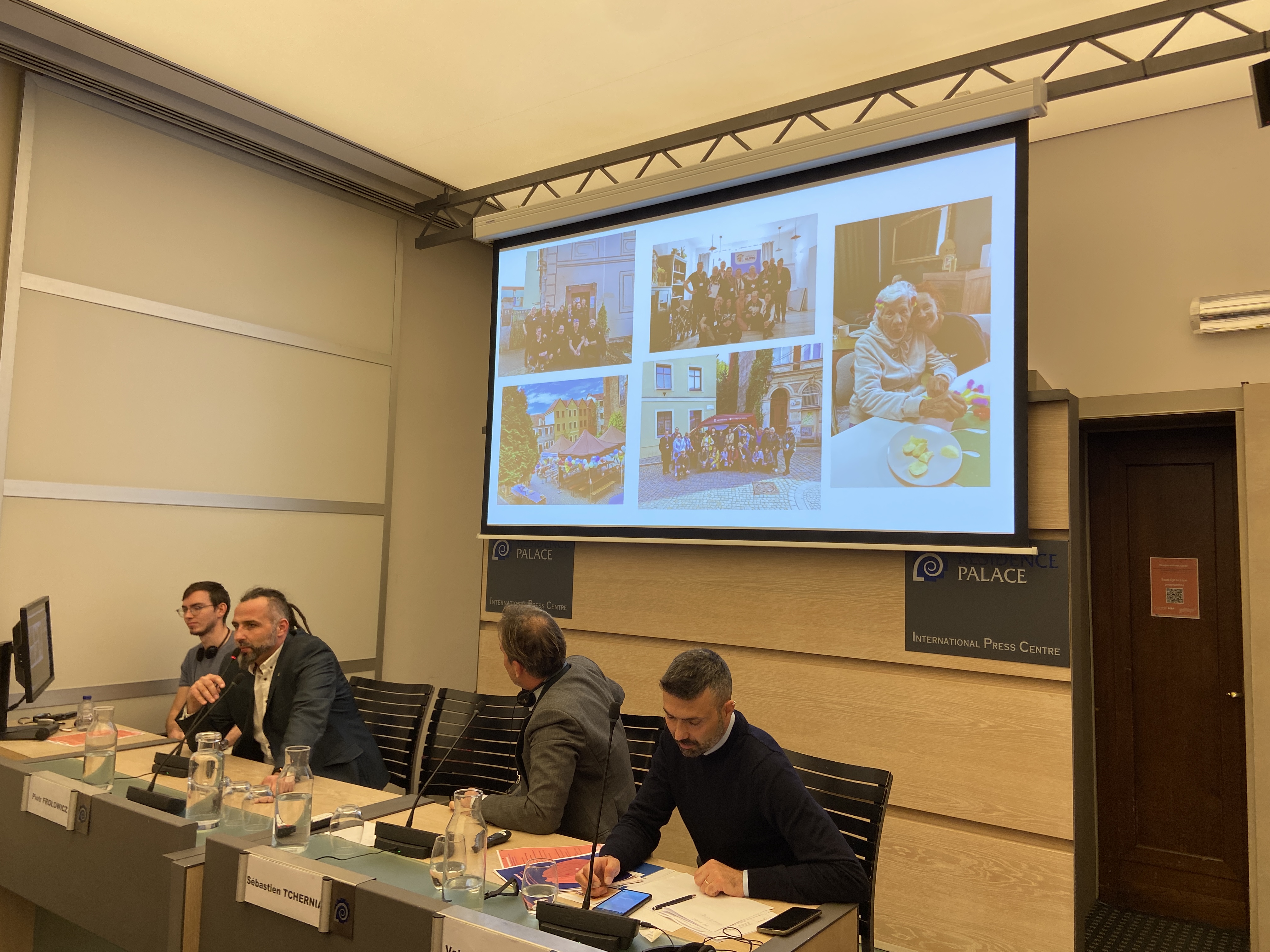
Picture: Piotr Frołowicz, from Social cooperative Alivio Group, presents his intervention
Quality of care and genuine concern for the care recipients are the main drivers of social innovation in cooperatives. For instance, the Cooperative Guild of Social and Community Workers has launched its own certification program – the Fair Care mark – which recognizes coproduction, codelivery, and coownership of care services. The business model of Les 3 Colonnes is also user-centered, as it allows not to institutionalise care recipients unnecessarily and enabling them to stay in their own homes instead. Alivio Group intentionally runs their services on a small scale in order to be able to provide individualised approach. They have also a special recruitment philosophy: instead of necessarily recruiting people with pre-existing care skills (which can anyway be scarce in the sector), they focus on finding employees with empathy and willingness to provide care and then train them, thus recognizing the human dimension at the core of the service.
Third panel
The third and final panel of the event was entitled “What future of the European Care Strategy?”. It brought a policy-oriented, European level, approach, discussing the future of the care sector in Europe and what is to come in the years to come following the European Care Strategy published in early September 2022. Three speakers where present in the panel:
- Flaviana Teodosiu, Team Leader Long-term Care at the European Commission’s DG Employment, Social Affairs and Inclusion.
- Thomas Bignal, Head of Policy at European Association of Service providers for Persons with Disabilities (EASPD), one of the leading care stakeholders in Brussels
- Giuseppe Guerini, President of CECOP, as well as member of the EESC, President of Confcooperative Bergamo and of Ecosviluppo, the social cooperative for labor market integration.
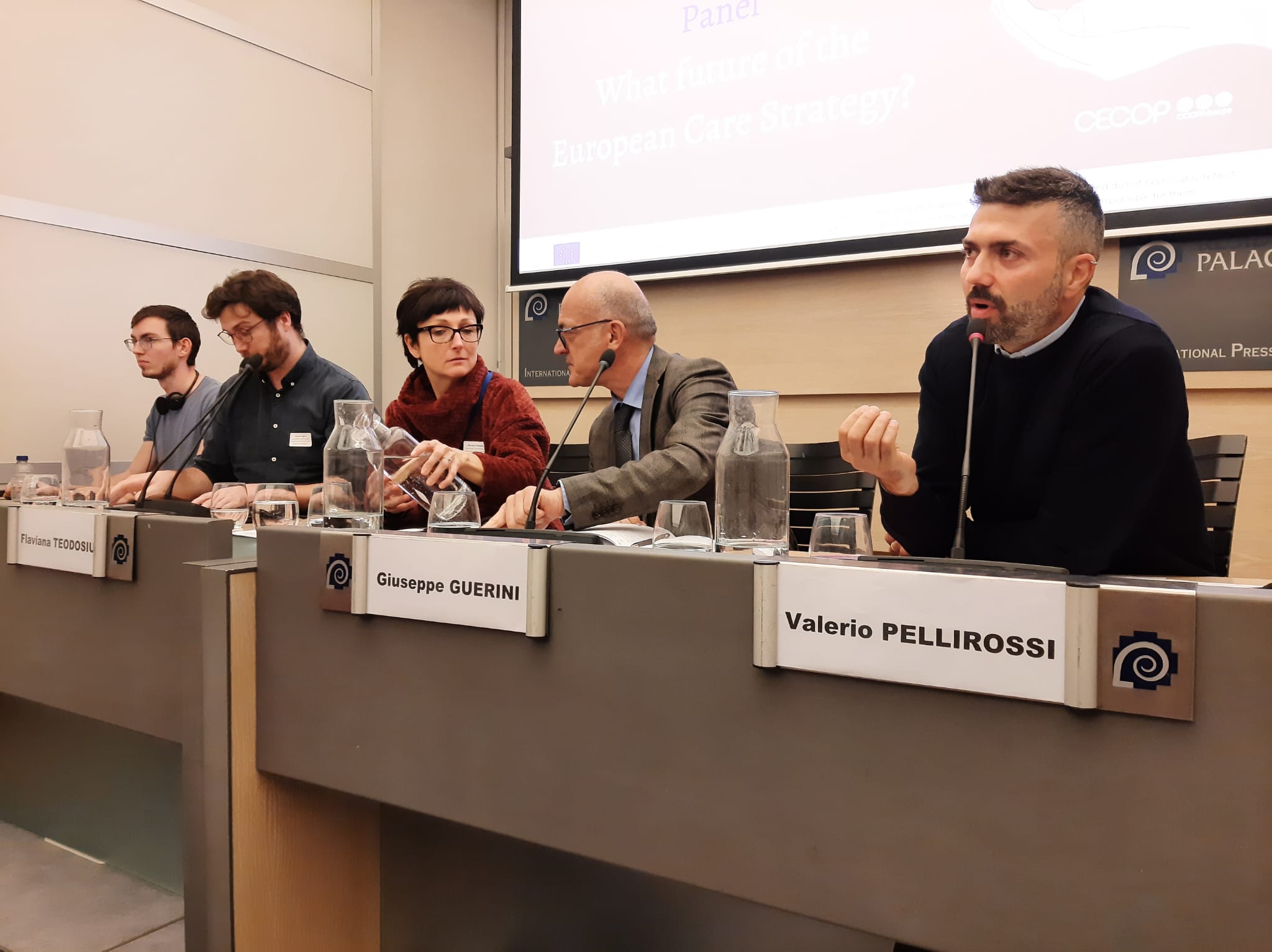
Picture: Third panel
There was a broad agreement in the panel that implementation of the European Care Strategy package will require additional social investment and upskilling/reskilling of workers. Flaviana Teodosiu from the European Commission highlighted the need for access to high quality, affordable care for all, as well as providing good work conditions to care givers, as well as improved evidence base and monitoring. Thomas Bignal of EASPD similarly focused on financing and the lack of qualified workers as the big structural issues plaguing the care sector. He noted that a more innovative approach to care makes it easier to recruit care providers. Finally, implementation of the European Care Strategy package will mainly take part on the national level, so stakeholders may want to advocate for national action plans for implementation. Guiseppe Guerini, president of CECOP, exposed the following five challenges he sees the care sector facing in the future:
- An ageing demographic, more and more Europeans will need care
- Care as a tool for local development
- Need for better and innovative governance in the care sector, especially for one that involves the care recipients and their family to ensure better quality of service
- Recognition of the skills of all carers
- Making migration an asset for Europe by making it an opportunity to address staffing issues in the European care sector

Picture: Maria Jepsen, Eurofound, and Diana Dovgan, CECOP
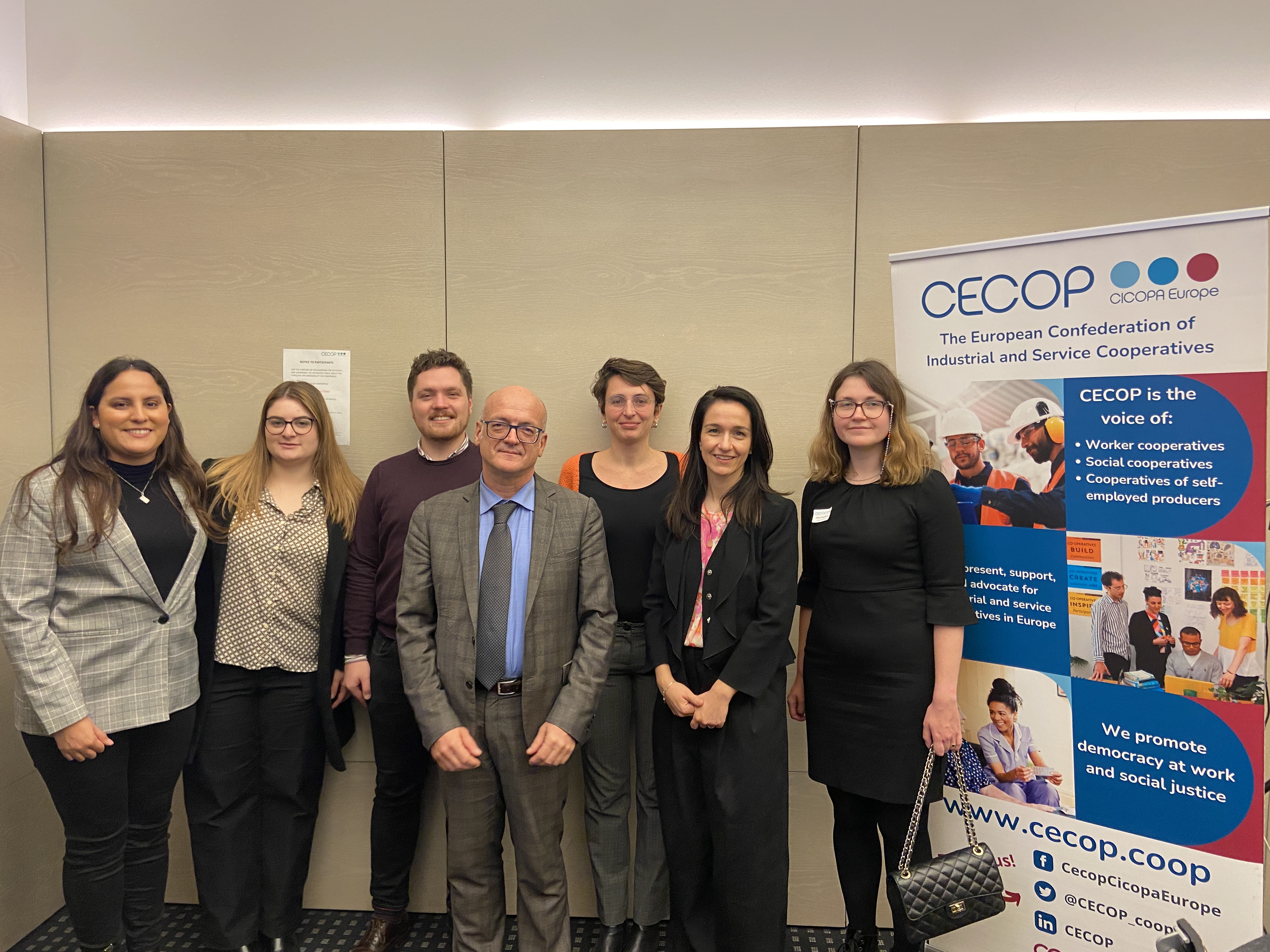
Picture: The CECOP team
Read the "Cooperatives Care" report here.
Watch the Docuseries on Care here.
Take a look at the actions of our communication #coopscare campaign here.







 Employment & Social Inclusion
Employment & Social Inclusion 


